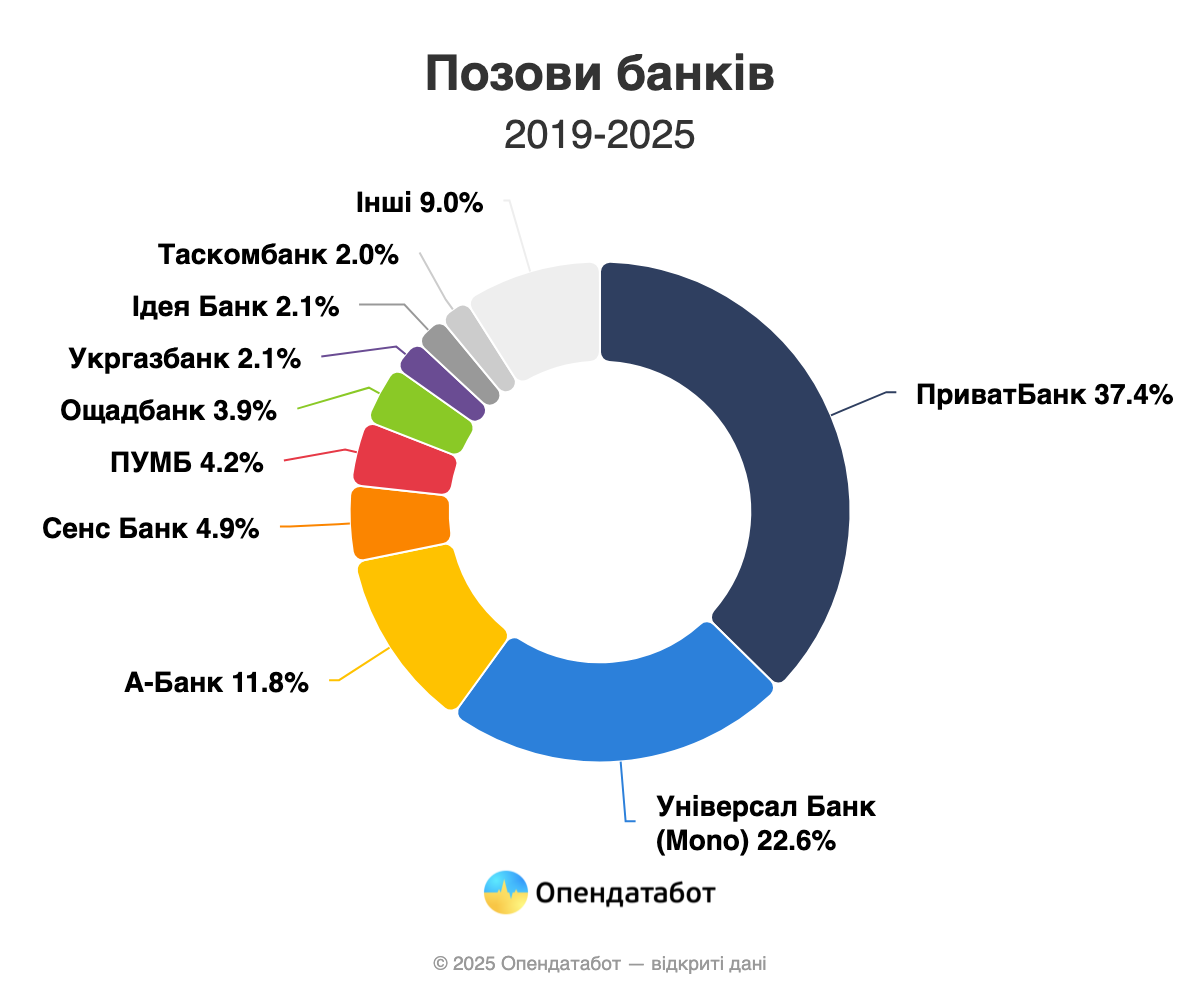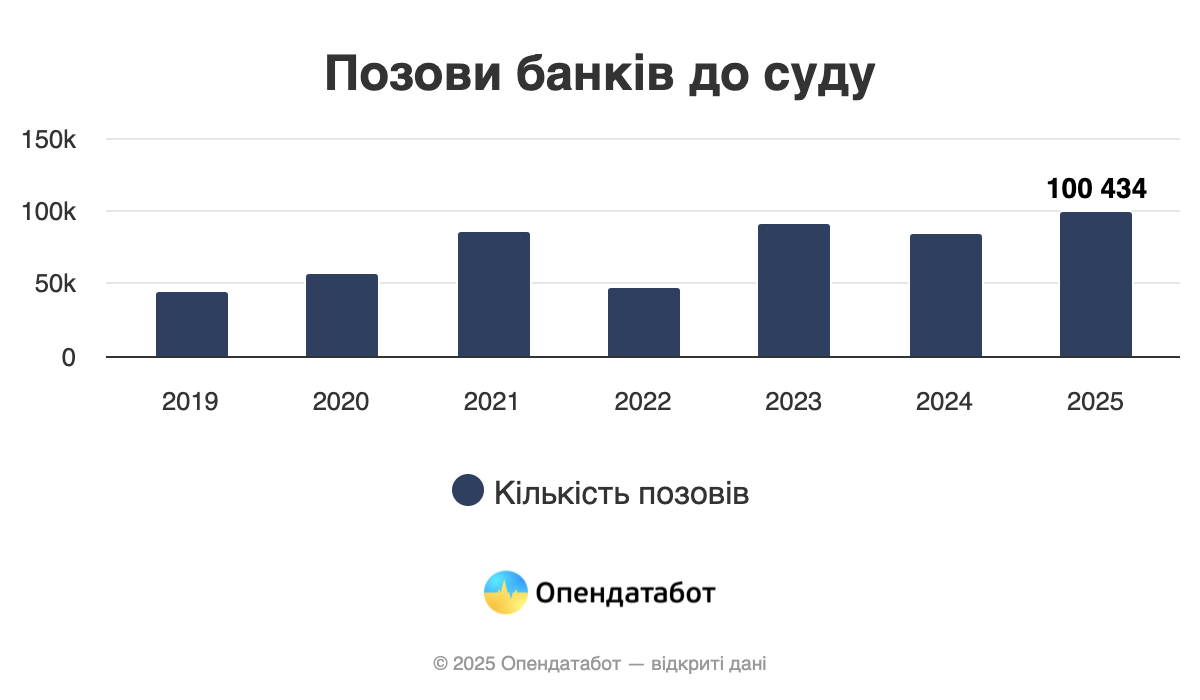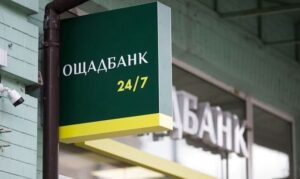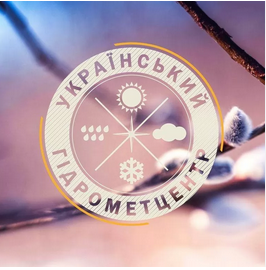
Banks are increasingly suing their debtors. According to the State Judicial Administration of Ukraine, a record 100,000 lawsuits were filed by Ukrainian banks this year. This is almost 1.5 times more than in the same period last year. In total, more than half a million lawsuits against debtors have been filed by banks over the past 7 years. Universal Bank (Mono), Privat and A-Bank account for 70% of the claims.
100,434 lawsuits against debtors were filed by Ukrainian banks. This is 1.5 times more than in the same period last year and a record for the last 7 years. A total of 511,865 lawsuits have been filed by banks since 2019.
Universal Bank/Mono (28,213 claims), A-Bank (22,221), and Privat (20,278) accounted for more than 70% of all claims this year. FUIB (9 , 225) and Sense Bank (6,831) are far behind.
In general, over the past 7 years, Privatbank has remained the unchanged leader in lawsuits against debtors – 191,353 lawsuits. It is followed by Universal Bank (115,702), A-Bank (60,421), Sense Bank (25,283) and FUIB (21,476).
TASKOMBANK saw the largest increase in the number of claims this year, up 3.5 times. PrivatBank (1.8 times), Kredobank (1.7 times), Accent Bank (1.6 times), and Sens Bank (1.6 times) also saw a significant increase.
At the same time, many banks have significantly reduced the number of court appeals. Unex Bank (4 times), Credit Agricole (2 times) and Ukrgasbank (2 times) showed the biggest drop.
It is worth noting that the ranking of the most “litigious” banks has been updated this year. New players entered the top – Radabank and Bank Alliance, which were not on the list last year. Instead, Accordbank and Unex Bank dropped out of the top twenty.
https://opendatabot.ua/analytics/banks-courts-2025



Last week, Oschadbank officially opened its first business hub, Oschadbiznes, in Kyiv and declared it a flagship space for micro, small, and medium-sized businesses (MSMEs).
“Ukrainian businesses need not only loans, but also an environment where ideas, partnerships, and scaling are born. That is why we have created the Oschadbusiness hub, which combines financing, knowledge, and opportunities,” said Serhiy Naumov, chairman of the board of Oschadbank.
The bank noted that the space also provides for educational and business events and has a place for networking.
In turn, Natalia Butkova-Vitvitskaya, a member of the board responsible for SMEs, noted that the hub will operate on a “single window” principle and will become a platform for consultations, participation in grant and partnership programs, as well as access to credit products.
“Next year, the bank plans to expand the Oschadbiznes hub network beyond the capital,” she said, without specifying the number of hubs.
The new branch is located at 26/14 Spaska Street and also includes a premium customer service area.
Oschadbank is the leader in Ukraine in terms of the number of branches—1,142—although in the third quarter, it reduced its network by five branches.
According to Oschadbank, its SME loan portfolio tripled between 2022 and 2025. State grants were received by 25,000 bank customers, and international financial organizations (IFOs) provided approximately UAH 1.5 billion in support. About 20% of the funding was directed to businesses in frontline regions, and half of the customers took advantage of IFO and government guarantee instruments.
As reported, in October 2025, the corporate segment’s loan portfolio grew by 2.6%, or UAH 26.9 billion, to UAH 970.1 billion. Hryvnia loans to businesses added 1.7%, or UAH 11.5 billion, reaching UAH 689.7 billion, while foreign currency loans increased by 4.2%, or $267 million, to $6.68 billion.
According to the National Bank, as of October 1 this year, Oschadbank, with total assets of UAH 485.81 billion, ranked second among 60 banks in Ukraine in terms of this indicator.

€16 million, with EU support, will support procurement of modern trolleybuses and infrastructure improvements
The European Bank for Reconstruction and Development (EBRD) is lending €16 million to the City of Cherkasy in Ukraine to finance the purchase of modern trolleybuses and the upgrade of related infrastructure for the city. The investment will strengthen sustainable urban mobility and ensure uninterrupted public transport services amid the wartime challenges facing Ukraine.
The loan, fully guaranteed by the City, will be co-financed by an investment grant of up to €4 million from the EBRD Shareholder Special Fund and will benefit from partial first loss risk cover under the European Union’s Ukraine Investment Framework Municipal Infrastructure and Industrial Resilience Programme (UIF MIIR). This promotes green transition and resilience in Ukraine’s economy by supporting sustainable investments in green city infrastructure, greening logistics chains, energy efficiency and green technology transfers.
The financing will enable Cherkasyelektrotrans, the municipal public transport operator in Cherkasy, to expand its fleet with new low-floor trolleybuses, modernise depots and other infrastructure, and extend and realign three trolleybus routes.
The project forms part of the EBRD’s Resilience and Livelihoods Framework, aimed at safeguarding essential municipal services during wartime. It will improve mobility for residents, including internally displaced people, and significantly reduce polluting emissions, contributing to better air quality. Aligned with the Paris Agreement’s mitigation and adaptation goals, the project is classified as 100 per cent green finance.
It also promotes inclusion by increasing accessibility for passengers with limited mobility and supporting gender equality through a partnership with UN Women’s She Drives programme, which will train and certify women and youth as trolleybus drivers.
By investing in Cherkasy’s public transport system, the EBRD is helping to maintain vital services, strengthen resilience and advance Ukraine’s green transition during a time of unprecedented challenge.
The EBRD has substantially increased its investments in Ukraine since Russia began its full-scale war there in 2022, deploying more than €8.5 billion to support energy security, vital infrastructure, food security, trade and the private sector.

The Swedish government plans to significantly increase aid to Ukraine, to at least SEK 10 billion in 2026, and in this regard is gradually phasing out development aid to five countries: Zimbabwe, Tanzania, Mozambique, Liberia, and Bolivia.
According to the Swedish government’s official website, in June 2025, the government decided to redirect Swedish aid and allocated approximately SEK 1.7 billion from the aid budget to provide additional support to Ukraine and for vital humanitarian measures around the world.
“We are at a decisive moment in European history. Ukraine is under pressure both at the negotiating table and on the front lines. To increase support for Ukraine, we need to make difficult priorities. Therefore, Sweden is gradually phasing out development aid to Zimbabwe, Tanzania, Mozambique, Liberia, and Bolivia,” said Minister for Aid and Foreign Trade Benjamin Dusa.
Due to the termination of bilateral strategies, embassies in Bolivia, Liberia, and Zimbabwe are being closed. Diplomatic relations with these countries remain important and will be maintained, for example, through accreditation from another country in the region.
It is specified that humanitarian aid is not affected by the termination of development aid, and Sweden continues to be one of the world’s largest donors of humanitarian aid and long-term development cooperation worldwide.

On Monday, December 8, in Ukraine without significant precipitation, only in the south of the country, in the afternoon in some places and in the central regions of light rain, in the western regions at night and in the morning in some places fog, reports Ukrhydrometcenter.
The wind is southeast, east, 7-12 m/s, in the southeastern part in some places gusts of 15-20 m/s. The temperature at night from 2° warm to 3° frost, during the day 0-5° warm; in Transcarpathia and the south of the country at night 1-6° warm, during the day 4-9°.
In Kiev on December 8, no significant precipitation, winds southeast, east, 5-10 m / s, the temperature at night about 0 °, during the day 2-4 ° warm.
According to the Central Geophysical Observatory named after Borys Sreznevskyi, the temperature at night is about 0°, and in the daytime 2-4° warm. Borys Sreznevsky, in Kiev on December 8, the highest daytime temperature was 12.2 in 1960, the lowest nighttime temperature was -19.7 in 1959.
Tuesday, December 9, rain and wet snow in the east at night and in the north during the day; no significant precipitation in the rest of the country. At night and in the morning in the Carpathian region, central and southern regions in some places fog.
Wind southwest, on the Left Bank southeast, 5-10 m/s. The temperature at night from 2° warm to 3° frost, during the day 0-5° warm; in Transcarpathia and the south of the country at night 1-6° warm, during the day 4-9°.
In Kiev on December 9, no significant precipitation at night, rain in the afternoon, wind southwest, 5-10 m/s. The temperature at night is about 0°, during the day 2-4° of heat.

Taxes, fees, and mandatory payments to the general and special funds of the state budget of Ukraine for January-November 2025 amounted to UAH 3.29 trillion, while cash expenditures amounted to UAH 4.54 trillion, which is approximately 24.1% and 20.3% higher than the corresponding figures for the same period in 2024.
According to operational data from the State Treasury Service, which the Ministry of Finance published on its website, general fund revenues increased by 23.5% to UAH 2.34 trillion, while expenditures increased by 18.1% to UAH 3.54 trillion.
In November this year, state budget revenues increased by 6.6% compared to November last year, to UAH 321.5 billion, including the general fund – by 4.2%, to UAH 229.3 billion. This is due to the receipt of grants worth UAH 34.3 billion last month, while in November last year such funding amounted to UAH 56.4 billion.
It is noted that the largest source of revenue in January-November this year remains VAT on goods imported into the customs territory of Ukraine – UAH 486.6 billion (UAH 424.0 billion in the first 11 months of 2024).
After raising the military tax from 1.5% to 5% and introducing a condition for reserving a salary of UAH 20,000 this year, personal income tax and military tax came in second place in terms of revenue for the 11 months of this year – UAH 324.6 billion compared to UAH 200.7 billion last year.
In third place this year is VAT on goods produced in Ukraine – UAH 278.3 billion for refunds of UAH 166.2 billion (UAH 242.7 billion for refunds of UAH 139.9 billion), while corporate income tax amounted to UAH 277.3 billion (UAH 251.3 billion), and excise tax amounted to UAH 255 billion (UAH 189.5 billion).
In addition, dividends and parts of the net profit of state-owned companies amounted to UAH 67.8 billion (UAH 69.2 billion), import and export duties – UAH 49.7 billion (UAH 43.8 billion), and rent payments for the use of subsoil resources – UAH 39.6 billion (UAH 42.8 billion).
The Ministry of Finance added that another UAH 84.2 billion (UAH 38.6 billion) was added to the budget from the National Bank’s profits, and grants amounted to UAH 381.2 billion (UAH 325.6 billion).
Revenues from the unified social tax to pension and social insurance funds in January-November 2025 increased by 21.1% to UAH 593.1 billion, including in November by 13.6% to UAH 55.8 billion.
The Ministry of Finance also reported that as part of the financing of the general fund of the state budget, state borrowings to it in January-November 2025 amounted to UAH 1.96 trillion, or 94.3% of the plan, including UAH 512.7 billion received on the domestic market from the placement of government bonds, including UAH 124.6 billion in foreign currency – $2.26 billion and EUR 645 million. At the same time, UAH 242.1 billion was raised through the issuance of military government bonds.
According to the release, approximately $34.7 billion, or UAH 1.44 trillion, was received from external sources, including approximately $24.0 billion under the ERA, with the total volume of this mechanism amounting to $50 billion.
In addition, Ukraine received another EUR 7.95 billion from the EU under the Ukraine Facility preferential long-term loan, $0.96 billion from the International Monetary Fund (IMF), and $0.57 billion from the World Bank for the projects “Transforming Health through Reform and Investment in Efficiency” (THRIVE), “Creating Resilient Infrastructure in Vulnerable Environments in Ukraine” (DRIVE), “Supporting Recovery through Sound Fiscal Management” (SURGE), “Supporting Internally Displaced Persons in Ukraine” (HOME), and “Modernizing Ukraine’s Social Support System.”
Payments on the repayment of public debt for January-November 2025 amounted to UAH 570.9 billion, or 94.2% of the plan, and payments on servicing amounted to UAH 319.9 billion, or 98.2% of the plan.
As reported, as a result of two major increases in July and October, the 2025 state budget currently has planned revenues (excluding grants) of UAH 2.50 trillion, while expenditures are UAH 4.65 trillion, including the general fund – UAH 2.28 trillion and UAH 4.29 trillion, respectively.
In 2024, the state budget received UAH 3.12 trillion in revenues, which is UAH 0.45 trillion, or 16.8%, more than the 2023 state budget. Under the general fund, revenue growth amounted to UAH 0.51 trillion, or 30.9%, to UAH 2.18 trillion, in particular, international financial assistance in the form of grants amounted to UAH 0.45 trillion compared to UAH 0.43 trillion in 2023.
State budget expenditures in 2024 increased by UAH 0.46 trillion, or 11.6%, compared to 2023, to UAH 4.48 trillion, in particular, under the general fund – by 15%, or UAH 0.45 trillion – to UAH 3.49 trillion.
On December 3, the Verkhovna Rada approved Ukraine’s state budget for 2026 with revenues of UAH 2.90 trillion and expenditures of UAH 4.82 trillion.